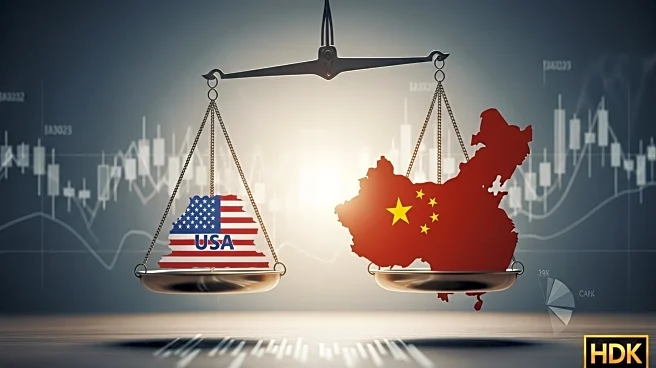What is the story about?
What's Happening?
Wall Street indexes experienced declines on October 14, 2025, driven by renewed concerns over China-U.S. trade tensions. The S&P 500 Index was 0.4% lower, and the Nasdaq 100 Index dropped 0.7%. The Cboe Volatility Index rose, indicating increased investor anxiety. The downturn was influenced by China's Commerce Ministry banning dealings with subsidiaries of South Korean shipbuilder Hanwha Ocean, impacting U.S. shipbuilding efforts. This move is seen as a response to President Trump's recent threats to increase tariffs on China. Additionally, major U.S. banks like JPMorgan Chase and Wells Fargo reported earnings, with mixed market reactions.
Why It's Important?
The decline in Wall Street indexes highlights the fragility of investor confidence amid ongoing trade tensions between the U.S. and China. The sanctions imposed by China on U.S.-related entities could disrupt the shipbuilding industry, affecting jobs and economic growth in related sectors. The increased volatility in the market reflects broader concerns about the stability of international trade relations and their impact on the U.S. economy. Companies involved in international trade and those reliant on global supply chains may face increased costs and operational challenges.
What's Next?
Investors are closely monitoring the situation for further developments in trade negotiations between the U.S. and China. The Federal Reserve's upcoming statements and corporate earnings reports will be pivotal in shaping market sentiment. Stakeholders in the shipbuilding industry may seek diplomatic solutions to mitigate the impact of the sanctions. Additionally, President Trump's administration may consider alternative strategies to counter China's maritime dominance.
Beyond the Headlines
The trade tensions underscore the geopolitical complexities of international commerce, where economic policies are increasingly used as tools of influence. The sanctions could lead to a reevaluation of global supply chains, prompting companies to diversify their partnerships to reduce dependency on any single country. This situation also raises ethical questions about the use of economic sanctions and their long-term implications for global trade norms.
















